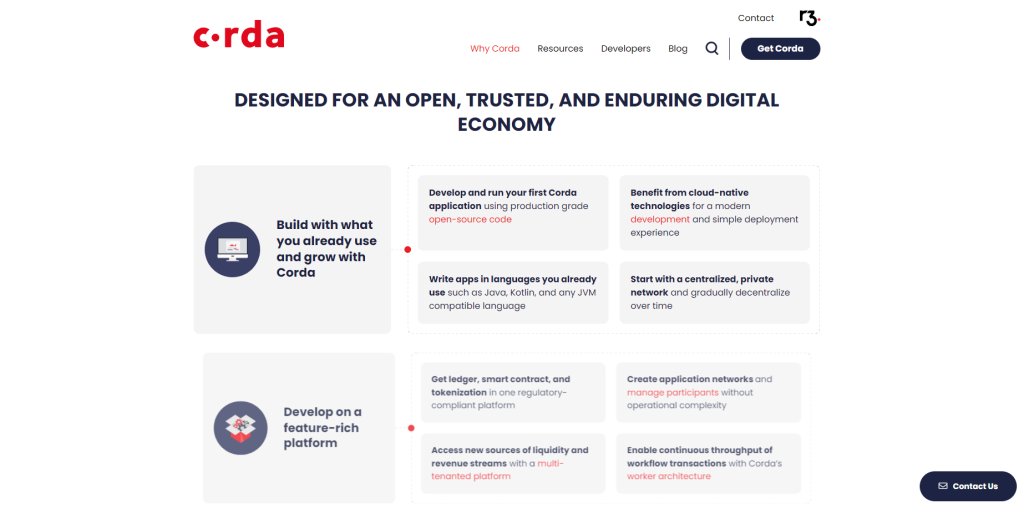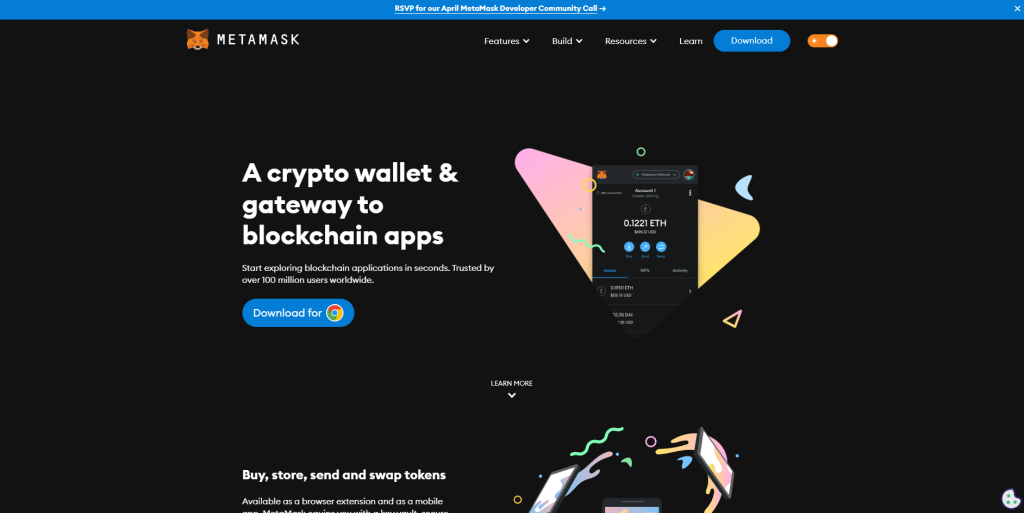Blockchain technology has evolved from being a niche concept to a transformative force across various industries. Its decentralized and immutable nature makes it ideal for building secure and transparent systems. As blockchain adoption continues to grow, developers are at the forefront of creating innovative solutions. To support their efforts, a plethora of blockchain development tools and platforms have emerged, each offering unique features and capabilities. In this comprehensive guide, we’ll delve into the top 18 blockchain development tools and platforms that empower developers to build robust blockchain applications.
1. Ethereum
Ethereum stands as one of the leading blockchain platforms, renowned for its smart contract functionality. Developers leverage Solidity, a programming language specific to Ethereum, to create decentralized applications (dApps) that run on the Ethereum Virtual Machine (EVM). Ethereum’s ecosystem includes tools like Remix and Truffle, which streamline smart contract development, testing, and deployment processes.
2. Hyperledger Fabric
Hyperledger Fabric, developed under the Linux Foundation, is a permissioned blockchain framework tailored for enterprise use cases. It offers a modular architecture, scalability, and privacy features, making it suitable for building consortium networks and business-focused blockchain solutions. Hyperledger Fabric’s emphasis on governance and access control appeals to industries such as finance and supply chain.
3. Truffle Suite
Truffle Suite is a comprehensive development environment for Ethereum developers. It encompasses tools like Truffle, Ganache, and Drizzle, simplifying the creation, testing, and deployment of Ethereum smart contracts. Truffle Suite’s robust testing capabilities and asset management streamline the development lifecycle for dApps.
According to archive.trufflesuite.com they: “Take care of managing your contract artifacts so you don’t have to. Includes support for custom deployments, library linking and complex Ethereum applications” .
4. Geth
Geth serves as the command-line interface for running Ethereum nodes. It enables developers to interact with the Ethereum network, deploy smart contracts, and participate in mining activities. Geth’s features include node management, transaction handling, and access to Ethereum’s JSON-RPC APIs, essential for blockchain developers.
5. Remix
Remix is a web-based Integrated Development Environment (IDE) specifically designed for Ethereum smart contract development. It offers a user-friendly interface with features like code highlighting, debugging tools, and one-click deployment options. Remix’s accessibility and real-time feedback enhance the efficiency of smart contract coding.
6. Corda

Corda is a blockchain platform tailored for enterprise applications, emphasizing privacy, scalability, and interoperability. Developed by R3, Corda facilitates secure and efficient peer-to-peer transactions within business networks. Its focus on regulatory compliance makes it suitable for industries like finance, healthcare, and trade finance.
7. Chainlink
Chainlink is a decentralized oracle network that connects smart contracts with real-world data and external APIs. Developers use Chainlink to access off-chain information securely, enabling smart contracts to execute based on real-time data triggers. Chainlink’s role in bridging blockchain and external systems enhances the functionality of decentralized applications.
8. OpenZeppelin
OpenZeppelin is a library for secure smart contract development on Ethereum. It offers pre-audited, reusable smart contract components that enhance security and efficiency in dApps. OpenZeppelin’s community-driven approach and comprehensive documentation make it a valuable resource for Ethereum developers.
9. R3 Corda Settler
The R3 Corda Settler is a payments framework that facilitates settlement of transactions on Corda networks using various payment rails, including cryptocurrencies. It simplifies cross-border payments and settlement processes, enhancing the usability of Corda-based applications in global scenarios.
10. Quorum
Quorum, developed by J.P. Morgan, is an enterprise-focused blockchain platform based on Ethereum. It offers features such as private transactions, permissioned networks, and high throughput, catering to the needs of financial institutions and large enterprises requiring privacy and scalability.
11. Solana
Solana is a high-performance blockchain platform known for its fast transaction speeds and low fees. It utilizes a unique consensus mechanism called Proof of History (PoH) to achieve scalability without compromising on decentralization. Solana’s architecture makes it suitable for building scalable decentralized applications (dApps) and decentralized finance (DeFi) protocols.
12. Web3.js
Web3.js is a JavaScript library that facilitates interaction with Ethereum nodes and smart contracts from web applications. It provides functions for sending transactions, querying blockchain data, and listening to events, enabling seamless integration of blockchain functionality into web-based projects. Web3.js plays a vital role in the development of blockchain-powered decentralized applications accessible through web browsers.
13. IPFS (InterPlanetary File System)
IPFS is a distributed file system designed to store and retrieve content based on content addressing. It complements blockchain technology by offering decentralized and resilient storage solutions for large files, media, and documents. IPFS integration enhances data availability and reduces reliance on centralized servers in blockchain applications.
14. Parity Substrate
Parity Substrate is a framework for building customizable blockchains tailored to specific use cases. It provides a modular architecture, runtime environment, and development tools for creating blockchain networks with custom features and consensus mechanisms. Parity Substrate’s flexibility appeals to developers seeking to build unique blockchain solutions beyond existing platforms.
15. MetaMask

MetaMask is a popular browser extension that serves as a wallet and gateway to Ethereum decentralized applications (dApps). It allows users to manage Ethereum accounts, interact with dApps, and securely store cryptocurrencies within their browser. MetaMask’s seamless integration and user-friendly interface contribute to the adoption of Ethereum-based applications among users.
16. Avalanche
Avalanche is a blockchain platform focusing on scalability, interoperability, and developer accessibility. It supports the deployment of custom subnets, known as “X-Chain” and “C-Chain,” catering to diverse use cases ranging from DeFi applications to enterprise solutions. Avalanche’s consensus protocols and network architecture contribute to its high throughput and low latency capabilities.
17. Hyperledger Composer
Hyperledger Composer provides a set of collaboration tools for building Hyperledger Fabric-based blockchain applications. It offers a modeling language, APIs, and a development environment for creating and deploying smart contracts and business networks on Hyperledger Fabric. Hyperledger Composer simplifies the process of building and integrating blockchain solutions within enterprise ecosystems.
18. Neo Blockchain
Neo is a blockchain platform designed for building scalable and high-throughput decentralized applications (dApps). It offers features such as digital assets, smart contracts, and identity management, making it a versatile platform for developers targeting various use cases in the blockchain space. Neo’s focus on developer-friendly tools and scalability contributes to its appeal among blockchain developers and enterprises.
Conclusion
Blockchain development tools and platforms play a pivotal role in empowering developers to create innovative and secure blockchain solutions across industries. From Ethereum’s smart contract capabilities to Hyperledger Fabric’s enterprise-grade features and specialized tools like Chainlink for data integration, each platform offers unique advantages for building decentralized applications and blockchain networks. As blockchain technology continues to evolve, developers will leverage these tools and platforms to drive the next wave of blockchain-powered innovations, transforming industries and enhancing digital roles globally.

Leave a Reply